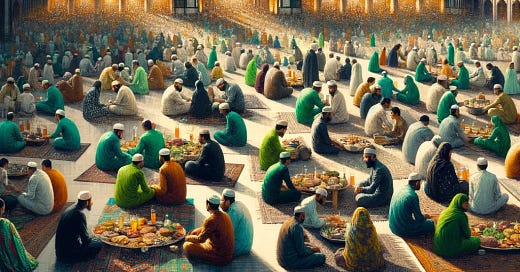Islamic New Year 1446 AH: A Unifying Event Across the Muslim World
When is Islamic New Year in 2024?
The Islamic New Year 1446, also known as Hijri New Year or Arabic New Year, is a significant event in the Muslim calendar. In 2024, this special day is expected to begin on the evening of Sunday, July 7th, in most countries. This day marks the first of Muharram, the first month of the Islamic lunar calendar. The occasion has prompted world leaders, including US President Joe Biden, to extend their greetings to the Muslim community worldwide.
However, the exact date of the Islamic New Year can vary by a day or two in different countries due to the sighting of the new crescent moon. For instance:
Saudi Arabia: The crescent moon was not sighted on July 5th (29th Dhul Hijjah), so Muharram 1, 1446 AH, began on July 6th after evening prayers.
India: The new moon was not sighted on July 6th, so the Islamic New Year 1446 will be celebrated on July 7th or 8th.
Significance of Islamic New Year
The Islamic New Year commemorates the Hijra, the migration of Prophet Muhammad (PBUH) and his followers from Mecca to Medina in 622 CE, marking the beginning of the Islamic era. The Hijri calendar, which started in 622 CE, is a lunar calendar with 12 months totaling 354 or 355 days.
Muharram, the first month of this calendar, is one of the four sacred months in Islam. The Day of Ashura, observed on the 10th day of Muharram, holds special significance for Shia Muslims as it marks the martyrdom of Husayn ibn Ali, the grandson of Prophet Muhammad (PBUH), in the Battle of Karbala in 680 CE.
Observances and Practices
Unlike the Gregorian New Year, the Islamic New Year is not marked by grand celebrations. Instead, it is a time for reflection, spiritual growth, and remembrance of historical events that shaped Islam. Muslims use this time to reflect on the passing of time, their mortality, and their spiritual journey.
Many Muslims mark the occasion by attending religious activities, offering prayers, and donating to charity. It is also common for Muslims to fast on the Day of Ashura and engage in acts of piety and remembrance.
Public Holiday and Community Activities
In many Muslim-majority countries, Islamic New Year is a public holiday, allowing for community activities and religious observances. Despite the lack of large-scale festivities, it fosters a sense of unity and shared heritage, providing an opportunity for Muslims to come together, remember their history, and plan for the year ahead with renewed faith and purpose.
In India, Islamic New Year is not a public holiday, but there are four main Muslim festivals that are gazetted holidays by the Central Government. Eid ul-Fitr, which marks the end of Ramadan, and Eid al-Adha, also known as Bakrid, the "Festival of Sacrifice," are mandatory holidays for central government offices. Eid Milad-un-Nabi, the birthday of Prophet Muhammad (PBUH), is a gazetted holiday in most states and union territories. Muharram, which marks the beginning of the Islamic New Year and is a day of mourning for Shia Muslims, is a restricted holiday, meaning central government employees have the option to take a paid holiday on this day. These festivals are an important part of India's religious and cultural diversity and are celebrated with great devotion by the Muslim community across the country.
A Unifying Occasion
The Islamic New Year, while quiet compared to other celebrations, plays a crucial role in unifying Muslims worldwide. The varying dates of observance based on moon sightings remind the Muslim community of the shared foundation of their faith despite geographical differences. This unity is further reinforced through the shared reverence for historical events like the Hijra and the martyrdom of Husayn ibn Ali, which are central to the Islamic faith.
In conclusion, Islamic New Year 1446 is expected to begin on the evening of July 7th in most countries, though the exact date may vary. This day marks the beginning of Muharram and the Islamic lunar calendar. It is a time for Muslims to reflect, pray, and strengthen their spiritual and communal bonds. Through quiet observance and community gatherings, the Islamic New Year serves as a powerful reminder of unity, faith, and the enduring legacy of Islamic history.




